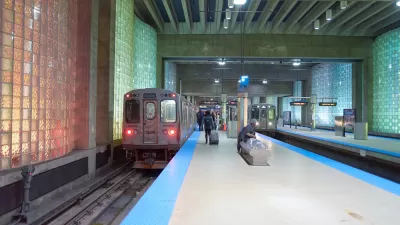Aaron M. Renn looks at Chicago's struggles over the last decade - one that saw the city "increasingly falling behind its large urban brethren" - and asks whether its aspirations for becoming a global city are delusional.
Following a decade that saw the city "experiencing a steep decline quite different from that of many other large cities," including rapid population decline and the highest percentage of job loses amongst the country's ten largest metro areas, Renn lays out the "host of challenges" for new mayor Rahm Emanuel.
According to Renn, the primary challenge may be one of unrealistic aspirations. "Many of Chicago's woes derive from the way it has thrown itself into being a 'global city' and the uncomfortable fact that its enthusiasm may be delusional."
"Chicago as a whole is less a global city than the unofficial capital of the Midwest, and its economy may still be more tied to that troubled region than it would like to admit. Like the Midwest generally, parts of Chicago suffer from a legacy of deindustrialization: blighted neighborhoods, few jobs, a lack of investment, and persistent poverty."
Renn concludes by suggesting how the city can begin to dig itself out of its current predicament: by focusing on areas such as tackling the city's fiscal crisis, improving the business climate, and changing the political culture.
"Fixing Chicago will be a big, difficult project, but it's necessary. The city's sparkling core may continue to shine, and magazines may continue to applaud the global city on Lake Michigan-but without a major change in direction, Chicago can expect to see still more people and jobs fleeing for more hospitable locales."
FULL STORY: The Second-Rate City?

Alabama: Trump Terminates Settlements for Black Communities Harmed By Raw Sewage
Trump deemed the landmark civil rights agreement “illegal DEI and environmental justice policy.”

Planetizen Federal Action Tracker
A weekly monitor of how Trump’s orders and actions are impacting planners and planning in America.

The 120 Year Old Tiny Home Villages That Sheltered San Francisco’s Earthquake Refugees
More than a century ago, San Francisco mobilized to house thousands of residents displaced by the 1906 earthquake. Could their strategy offer a model for the present?

In Both Crashes and Crime, Public Transportation is Far Safer than Driving
Contrary to popular assumptions, public transportation has far lower crash and crime rates than automobile travel. For safer communities, improve and encourage transit travel.

Report: Zoning Reforms Should Complement Nashville’s Ambitious Transit Plan
Without reform, restrictive zoning codes will limit the impact of the city’s planned transit expansion and could exclude some of the residents who depend on transit the most.

Judge Orders Release of Frozen IRA, IIJA Funding
The decision is a victory for environmental groups who charged that freezing funds for critical infrastructure and disaster response programs caused “real and irreparable harm” to communities.
Urban Design for Planners 1: Software Tools
This six-course series explores essential urban design concepts using open source software and equips planners with the tools they need to participate fully in the urban design process.
Planning for Universal Design
Learn the tools for implementing Universal Design in planning regulations.
Clanton & Associates, Inc.
Jessamine County Fiscal Court
Institute for Housing and Urban Development Studies (IHS)
City of Grandview
Harvard GSD Executive Education
Toledo-Lucas County Plan Commissions
Salt Lake City
NYU Wagner Graduate School of Public Service




























